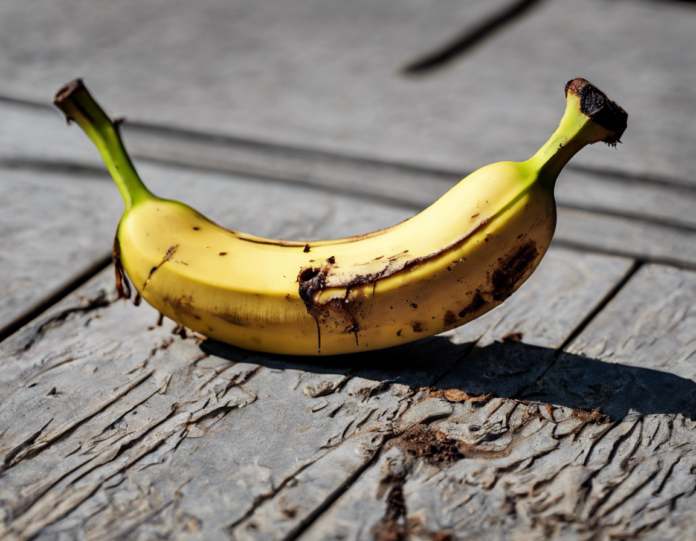Bananas are a popular fruit enjoyed by people all around the world for their convenience, flavor, and numerous health benefits. However, many of us may have encountered a rotten banana at some point either forgotten in the pantry or hidden in the fruit bowl. While the temptation to eat a slightly overripe banana may arise, it is important to understand why consuming a rotten banana is not advisable.
What Causes a Banana to Rot?
Bananas ripen and then begin to spoil due to a process called enzymatic browning. When bananas are exposed to air, an enzyme called polyphenol oxidase reacts with phenols in the banana to produce melanin, turning the banana brown and eventually black. As a banana ripens, its starches turn into sugars, making it sweeter and softer. However, this also makes it more susceptible to decay from bacteria and mold.
The Dangers of Eating a Rotten Banana
Consuming a rotten banana can pose several risks to your health:
-
Mold and Bacteria: A blackened banana is a breeding ground for mold and bacteria. Eating a banana in this state can lead to stomach upset, food poisoning, or even more serious illnesses in individuals with weakened immune systems.
-
Aflatoxins: Some molds that grow on rotting bananas can produce harmful toxins called aflatoxins. Chronic exposure to aflatoxins has been linked to liver damage and an increased risk of liver cancer.
-
Digestive Issues: Overripe bananas contain higher levels of sugars and alcohols, which can cause digestive discomfort such as bloating, gas, and diarrhea in some individuals, especially those with irritable bowel syndrome (IBS) or fructose intolerance.
-
Nutrient Loss: As a banana ripens and rots, it loses some of its nutritional value. Vitamin C, a potent antioxidant, is particularly sensitive to heat and oxygen exposure, both of which increase as the banana ripens. Eating a rotten banana may not provide you with the same nutrient benefits as a fresh one.
Signs of a Rotten Banana
It is important to be able to identify a rotten banana to avoid consuming it:
- Mold: Visible mold growth on the peel or flesh of the banana indicates spoilage.
- Unpleasant Odor: A sour or alcoholic smell coming from the banana signifies that it has gone bad.
- Texture Changes: Rotten bananas become mushy or slimy to the touch.
- Fruit Flies: The presence of fruit flies around the banana is a clear sign of decay.
Alternatives to Eating a Rotten Banana
If you have a rotten banana on hand and are reluctant to throw it away, there are several alternative uses for it:
- Banana bread: Overripe bananas are perfect for baking banana bread, as the sweetness and soft texture enhance the flavor and moistness of the bread.
- Smoothies: Blend a rotten banana into a smoothie with other fresh fruits and yogurt for a sweet and creamy treat.
- Fertilizer: Compost rotten bananas to create nutrient-rich fertilizer for your garden.
- Face mask: Mix mashed banana with honey or yogurt to create a nourishing face mask for glowing skin.
Frequently Asked Questions (FAQs)
- Can you get sick from eating a rotten banana?
-
Yes, eating a rotten banana can lead to stomach upset, food poisoning, and exposure to harmful toxins like aflatoxins.
-
Can you cut off the rotten parts of a banana and still eat it?
-
It is not advisable to eat a banana with rotten spots, as the entire fruit is likely contaminated. Mold and bacteria can spread beyond what is visible to the naked eye.
-
How long does it take for a banana to rot?
-
The ripening process of a banana typically takes 3-5 days at room temperature. Once a banana starts to turn brown and black, it can rot completely within a few more days.
-
Are there any health benefits to eating slightly overripe bananas?
-
While overripe bananas may still contain some nutrients, their sugar content is higher, which can outweigh any potential benefits. It is best to consume bananas when they are at their optimal ripeness.
-
What is the best way to store bananas to prevent them from rotting quickly?
- Keep bananas at room temperature away from direct sunlight and store them separately from other fruits to prevent them from ripening too quickly. Refrigerating bananas can slow down the ripening process but may also cause the peel to darken.
In conclusion, while a slightly overripe banana may still be safe to eat, a rotten banana should be avoided due to the risks associated with mold, bacteria, toxins, and digestive issues. It is essential to pay attention to the signs of spoilage and dispose of rotten bananas to protect your health. Consider alternative uses for a rotten banana or ensure you consume them at their optimal ripeness to enjoy their full flavor and nutritional benefits.

